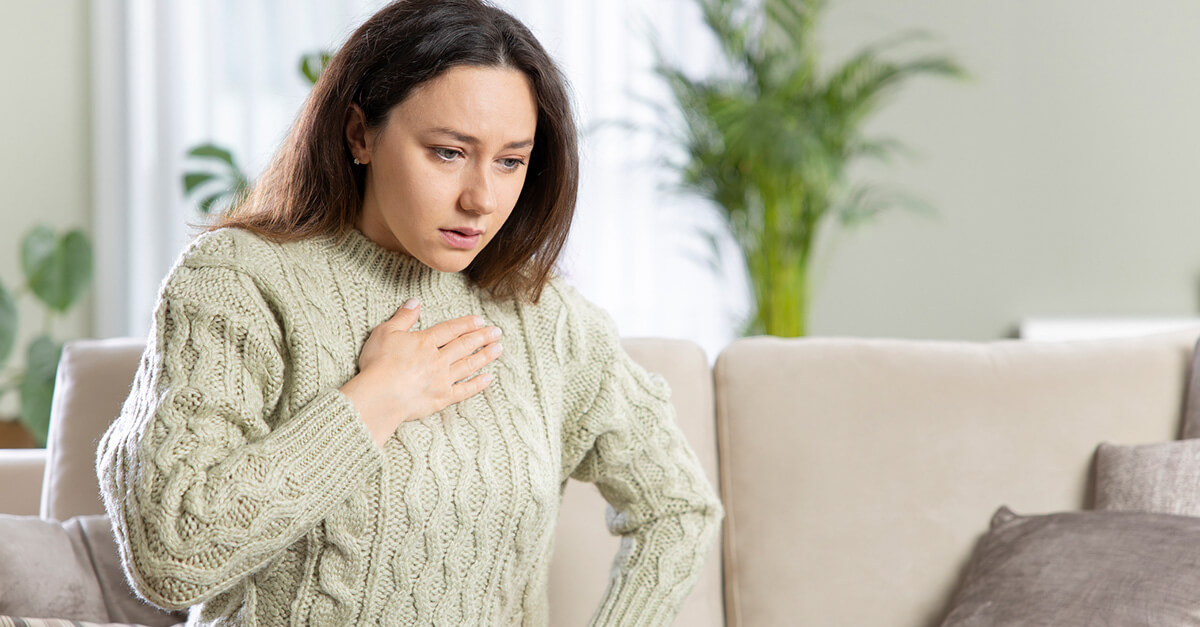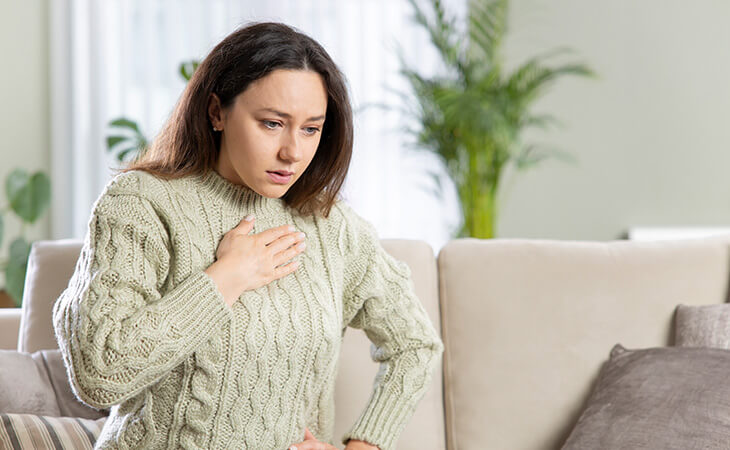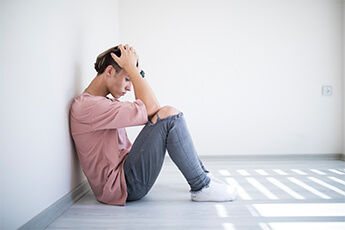About panic attacks and panic disorder


As many as 1 in 10 Americans will experience a panic attack this year. Panic attacks cause a sudden intense fear or discomfort in situations that typically don’t pose a threat. Adults, as well as children, who experience anxiety are more prone to panic attacks. Repeated panic attacks can lead to panic disorder.
From the community: “I’ve been feeling so anxious lately and having a lot of heart palpitations and fear of death or something bad happening for no reason. I feel like I’m losing my mind, and the more I think about it the more I convince myself something is wrong with me. I’ve had this happen back 4 years ago where it’s been so bad I’ve went to the er, but now it’s coming back again. I’m on Prozac 20 mg and I feel like nothing is ever going to change and I’ll feel like this the rest of my life.” – Inspire member
What’s the difference between anxiety and panic disorder?
Anxiety disorders are a type of mental health disorder that cause persistent, extreme feelings of fear, distress, or apprehension. These feelings persist for at least three months. Close to 43 million Americans have an anxiety disorder, making it one of the most common mental health disorders.
Panic disorder is one type of anxiety disorder that occurs when you have frequent panic attacks. You may change your behaviors in order to avoid certain places, people, or activities that trigger a panic attack.
What are panic attacks (anxiety attacks)?
A panic attack is a physical response of extreme fear or anxiety to something that doesn’t pose a real danger. Sometimes panic attacks come on for no apparent reason. You may feel like you’re losing control or having a heart attack. Some people use the term anxiety attack to describe these feelings.
What are the symptoms of a panic attack (anxiety attack)?
Panic attacks can last for several minutes, with symptoms tending to peak about 10 minutes into the attack. The symptoms then gradually diminish. You may feel exhausted or depleted afterward.
Symptoms of a panic attack include:
chest pain
dizziness or lightheadedness
nausea
racing heart or heart palpitations
shortness of breath or difficulty breathing
sweating or chills
trembling or shaking
How do panic attacks lead to panic disorder?
Not everyone who has panic attacks will develop panic disorder. With proper treatment, you can learn to prevent panic attacks. But about 3% of people with panic attacks develop panic disorder. When you have panic disorder, it means you worry excessively about having another panic attack. You may go out of your way to avoid the things known to bring on an attack.
What causes panic attacks?
Experts are still trying to determine why some people have panic attacks. You’re most likely to have your first panic attack during your early 20s. But people of all ages can have a panic attack. For unknown reasons, women are twice as likely to have frequent panic attacks that lead to panic disorder.
Your nervous system and brain play critical roles in how your body responds to anxiety-inducing events. You may be more prone to panic attacks if you have:
family history of mental disorders, especially other types of anxiety disorders
major life changes like a divorce, financial struggles, or serious illness
other mental health disorders like post-traumatic stress disorder (PTSD) or a mood disorder like depression
problems with substance abuse, excessive smoking, or caffeine consumption
trauma from the loss of a loved one, abuse, an accident, or assault
From the community:“I may be wrong, but the way I see it there are two types of panic attacks. One, people call an anxiety attack, and the other, people call a panic attack. Sometimes people are referring to an anxiety attack when they say panic attack, and sometimes they really did have a panic attack. (keep in mind, I don't know how much of this is actually true. This is just my own experience) I have experienced both. In my first panic attack [yes, it was a panic attack not an anxiety attack] I was reading a book in my room, and it fairly sprang upon me and the next moment I thought I was going to die, or I was going insane… Another time, however, I was very nervous about several upcoming tests at my school. I was studying and I felt strange for a moment and then my heart started beating faster and faster… I did not feel that I was going to die or go insane, but I did feel overly scared for the moment and was experiencing a "spike," so to speak, in my anxiety.” – Inspire member
How are panic attacks diagnosed?
You may see your primary care doctor to rule out a heart, respiratory, or thyroid condition that causes similar symptoms. If your doctor can’t find a cause, they may diagnose you with panic attacks or panic disorder. Or they may refer you to a mental health professional, such as a psychiatrist, psychologist, or licensed clinical social worker.
A psychiatrist is a medical doctor who diagnoses and treats mental health disorders. These experts refer to criteria established in the latest American Psychiatric Association’s Diagnostic and Statistical Manual of Mental Disorders (DSM-5-TR) to make a diagnosis.
DSM criteria for a panic disorder diagnosis include:
recurrent, unexpected panic attacks that cause at least four panic attack symptoms
persistent fear or worry one month after a panic attack about having another one or experiencing its symptoms
avoiding behaviors like changing your routines to not see places, people, or objects that might trigger a panic attack
From the community:“There are a number of ways to slow down an attack. Everyone is different.. I suggest you find ways to breath through it. I know this.. The worst thing u can do is acknowledge it. In other words, don't give it any power. With certain techniques you will find a way that diffuses it and find what works for you but you have to do your homework. My suggestion is try to focus on three different things and touch three different things. For instance.. If I'm in my car I read people's licenses plates safely and take some breathes or like the previous comment.. Think of something funny or at best distract your mind on something else. I've had 1000s of them over 30 years. Yes, they are terrifying but I can tell u this for sure. Your not gonna die or lose your mind. Best of luck. You can do it!” – Inspire member
How are panic attacks treated?
Proper treatments for panic attacks can lower your risk of developing panic disorder. These treatments can also reduce the frequency and intensity of panic attacks, eventually ending the attacks.
Panic attack treatments include:
cognitive behavioral therapy (CBT)
medications
Cognitive behavioral therapy (CBT)
Cognitive behavioral therapy (CBT) is a type of psychotherapy (talk therapy). A mental health professional helps you identify panic attack triggers. You then learn strategies to change the way you think, feel, and respond to these triggers. You use these strategies when you encounter the triggers in daily life. Over time, you stop feeling anxious or panicky.
Medications
For frequent panic attacks or panic disorder, you may take medications in addition to getting therapy. The U.S. Food and Drug Administration (FDA) has approved the anti-anxiety medications alprazolam and clonazepam for the treatment of panic disorders. These drugs are benzodiazepines and can become habit-forming. For this reason, they’re for short-term use only. For longer term relief, your doctor may prescribe antidepressants. These medications can lessen the frequency and severity of panic attacks.
Can you prevent panic attacks?
You can take steps to prevent or manage panic attacks, like using calming techniques or practicing mindfulness or meditation. It may also help to:
avoid herbal supplements that make you jittery or anxious
cut back on caffeine and alcohol
exercise regularly and eat a nutritious diet
find healthy ways to manage stress
improve your sleep habits
seek help to quit smoking or recover from substance abuse
Sources
About DSM-5. American Psychiatric Association.
What are anxiety disorders? American Psychiatric Association. June 2021.
Anxiety disorders. Cleveland Clinic. December 2020.
Panic disorder. Cleveland Clinic. August 2020.
Panic attacks and panic disorder. HelpGuide. October 2021.
Anxiety disorders. Mayo Clinic. May 2018.
Panic attacks and panic disorder. Mayo Clinic. May 2018.
Quick facts and statistics about mental health. Mental Health America.
Anxiety disorders. National Alliance on Mental Illness. December 2017.
Anxiety disorders. National Institute of Mental Health. April 2022.
Panic disorder: When fear overwhelms. National Institute of Mental Health. 2022.
Disclaimer
Member comments are lightly edited for length and to remove identifying information but are otherwise reproduced as they appear in the community as part of public posts.
This content is for general informational purposes only and does not necessarily reflect the views and opinions of any organization or individual. The content should not be used as a substitute for professional medical advice, diagnosis, or treatment. Please consult your healthcare provider about any questions you may have regarding a medical condition.




